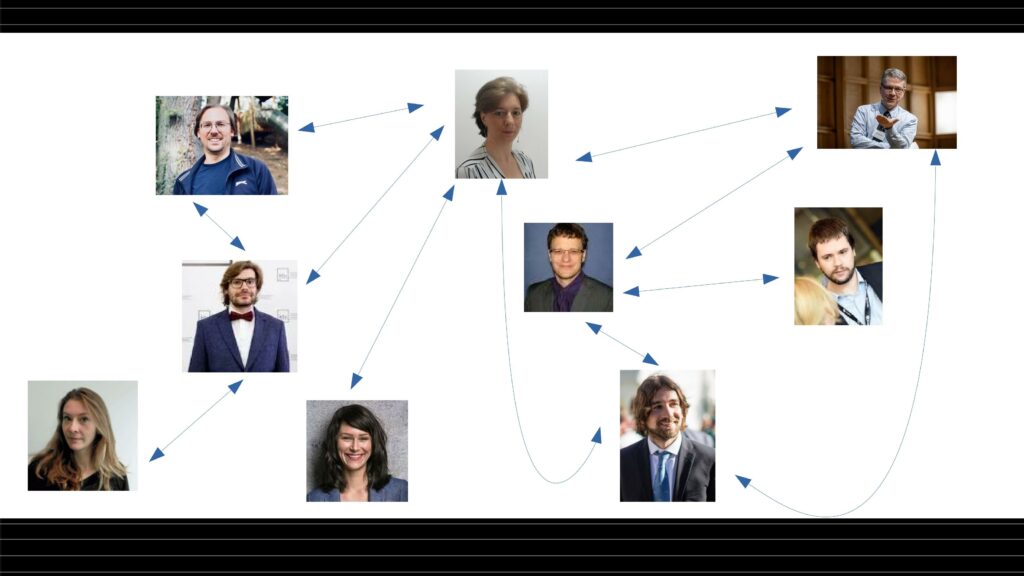Toxic Material(itie)s: Eco-Material Entanglements in Art
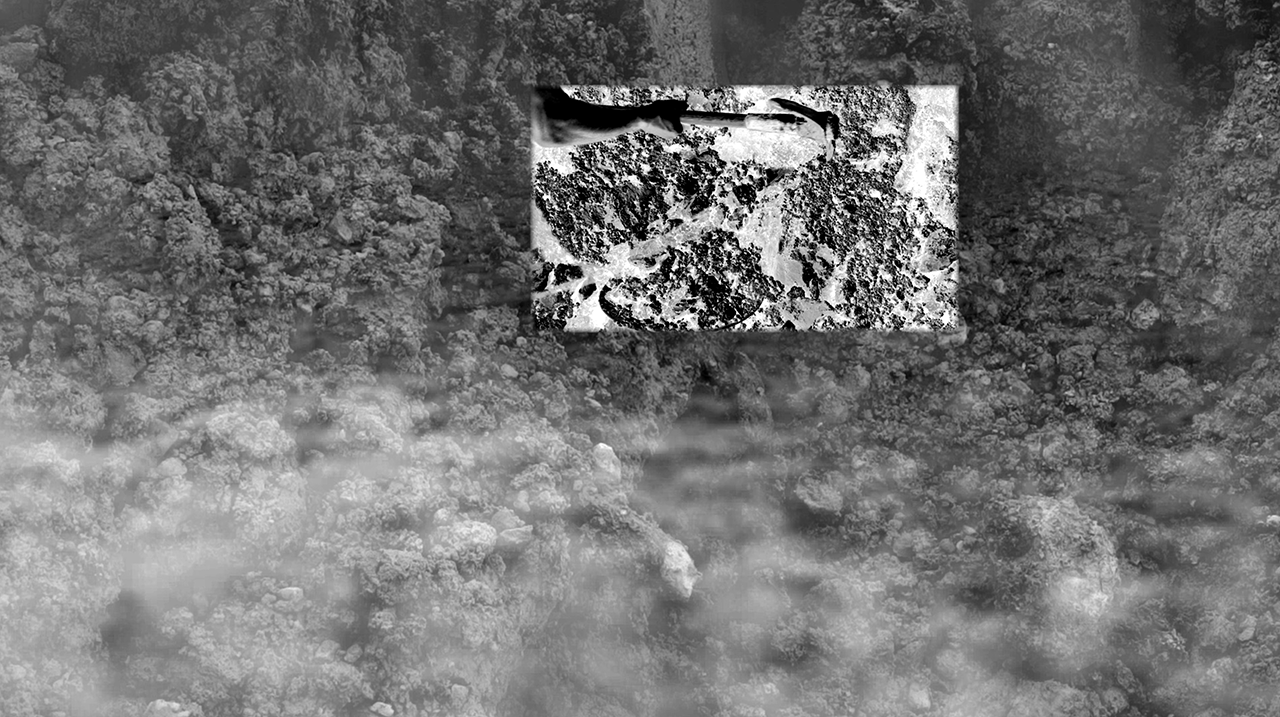
Workshop at the Käte Hamburger Kolleg: Cultures of Research (c:o/re)
6 – 7 December 2023
Organized by
Käte Hamburger Kolleg: Cultures of Research (c:o/re) &
Christian Berger (Universität Siegen), Ruby de Vos (University of Groningen),
Kyveli Mavrokordopoulou (Vrije Universiteit Amsterdam)
Our workshop sets out from the obvious, yet underexplored assumption, that much of the very stuff that art is made of is toxic. Whether working in the studio, in the dark room, in the quarry, or at contaminated sites, artists have been, and continue to be, exposed to a wide range of toxic materials. But exposure always goes hand in hand with its inevitable corollary, pollution—from the dumped toxic waste generated by the production of photographic materials to the air and water pollution generated by marble extraction. The toxicity of artistic materials extends far beyond the hazards of the artist’s job—they are part of larger environmental issues. So what can we learn when we explore artworks through the lens of their materiality within an expanded frame that is attentive to their art historical as well as environmental and sociopolitical context?
See the full program here.
To attend, please register with events@khk.rwth-aachen.de

Tagung: Briefe des 15. Jahrhunderts als Quellen für interkulturelle Kontakte zwischen Italien und dem Osmanischen Reich
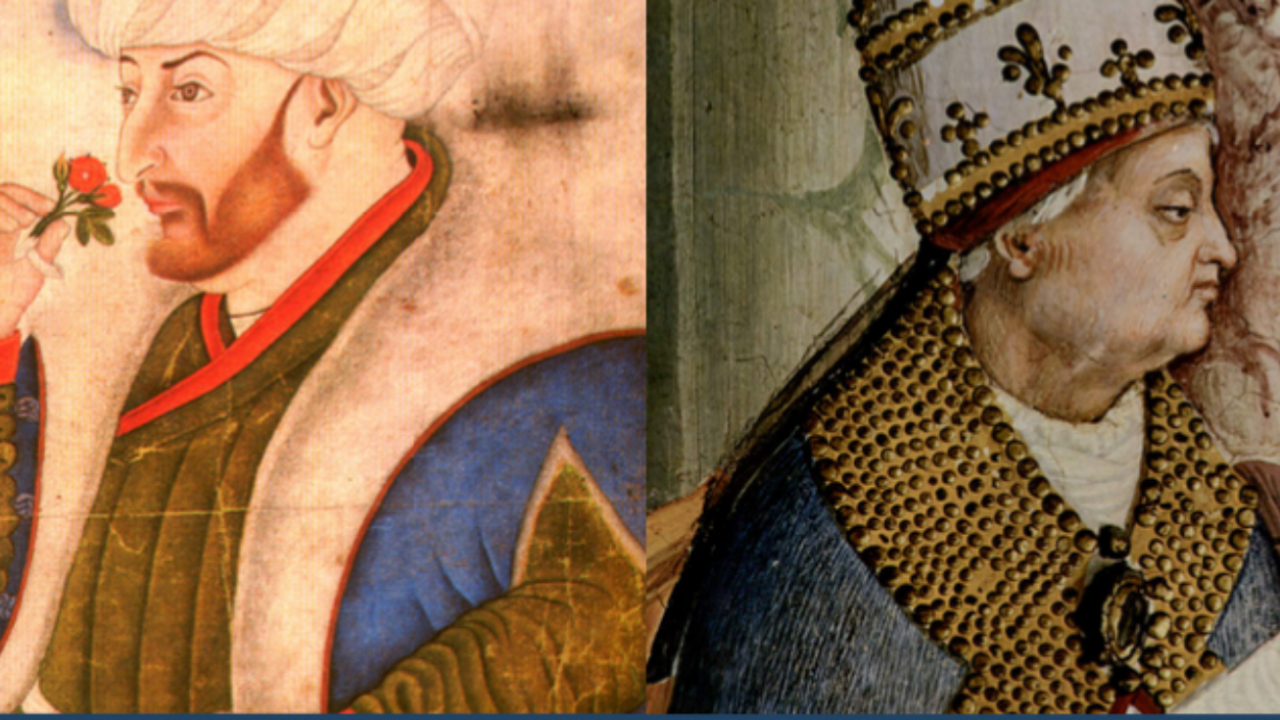
From the 19th to 20th October 2023, a conference on “Briefe des 15. Jahrhunderts als Quellen für interkulturelle Kontakte zwischen Italien und dem Osmanischen Reich” will take place at c:o/re, organized by Florian Hartmann.
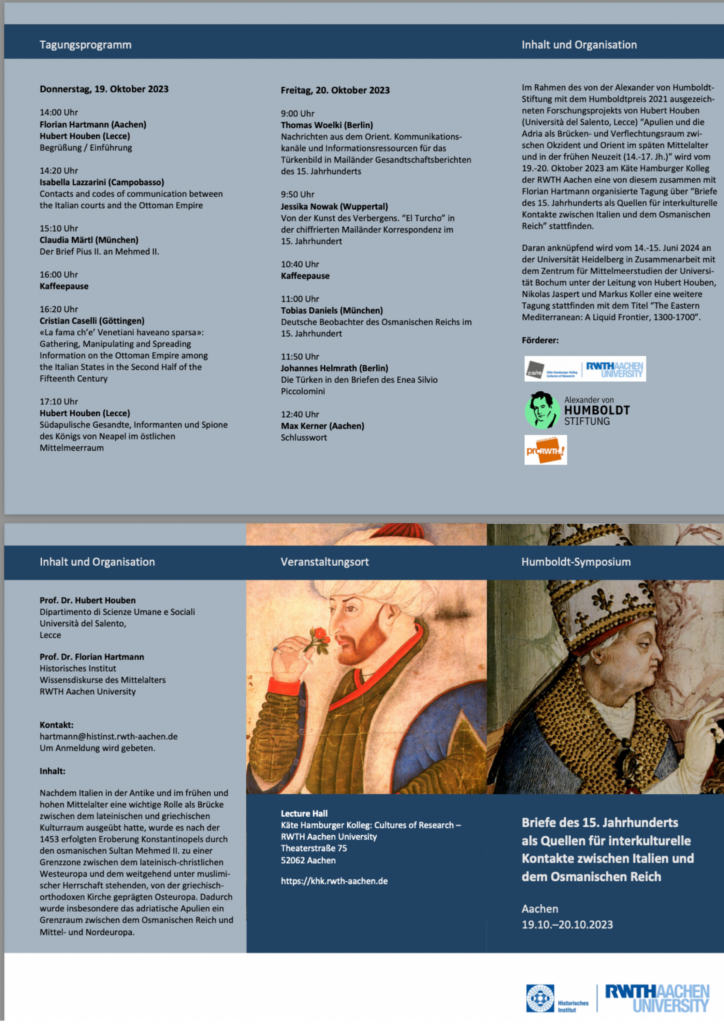
Upcoming Workshop: Turning Points in Reflections on Science and Technology. Toward Historicizing STS
On March 14-15, 2023 the c:o/re workshop Turning Points in Reflections on Science and Technology: Towards Historicizing STS will take place. The workshop focuses on the 20th and 21st Century intellectual history of science and technology. It aims at opening up the field by historicizing Science and Technology Studies from various historical turns. Furthermore, it aims at discussing the various notions of “historicizing STS”. The Program is available below and here:
Software as research culture: new study group at c:/ore, focused on software
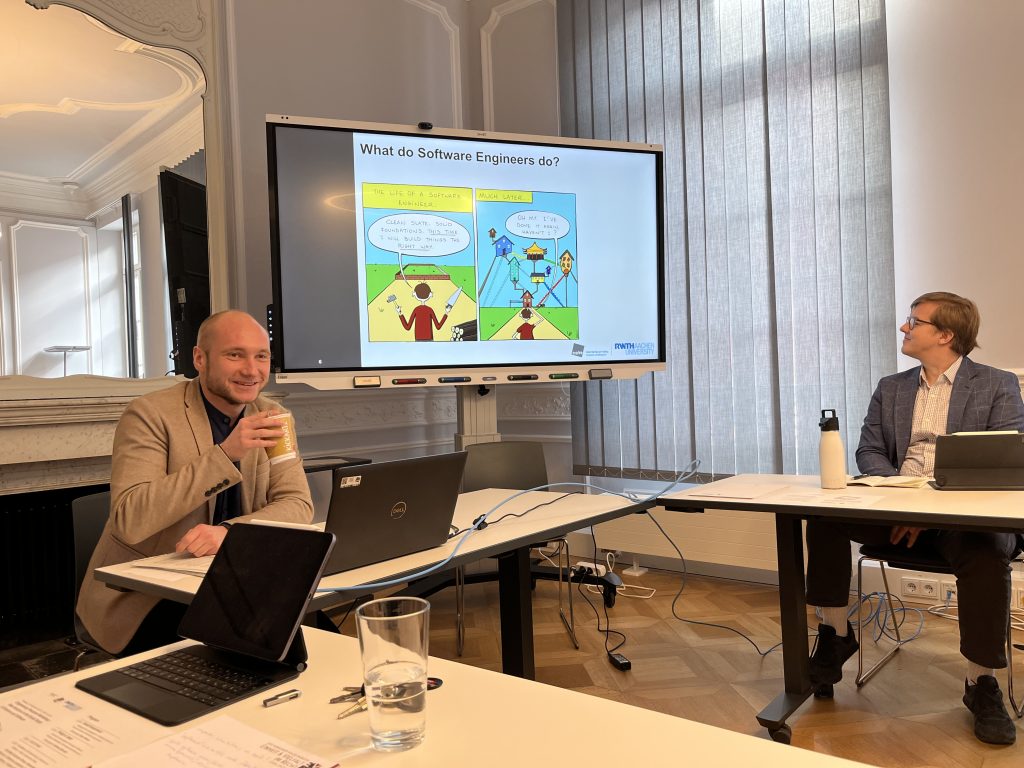
The work that this group pursues aligns with that of the Computational Science Studies Lab, set up by Professor Gabriele Gramelsberger, Chair for Philosophy of Science and Technology (Humtec, RWTH Aachen University) and Director of c:o/re. The work of c:o/re fellow Alexandre Hocquet and his co-author Frederic Wieber on computational chemistry has been instrumental to setting the directions of this research group. An important observation by Alexandre Hocquet, through which this group is working to conceptualize software, is that software is not just code. It involves much more, being a cultural practice. Also, a critical insight came from Gabriele Gramelsberger who stated that “software is an alien”.
On November 8 and 9 the Engineering Practices Workshop: New Horizons in the Social Study of Science and Software took place at c:o/re. This workshop marks the formation of a group, within c:o/re, focused on software research. The group consists in former and current c:o/re fellows and c:o/re team members, all of whom share an interest for software studies, but coming from various angles.
The workshop started with two talks by c:o/re team members Dawid Kasprowicz on Managing the unmanageable: Is software engineering the art or science of scientific programming? and Phillip H. Roth on Scientific communication in the age of software: Sorting out materiality, community and infrastructure. c:o/re fellows Benjamin Peters and Arianna Borrelli acted as discussants to these presentations, opening then the debate to the entire group. Dawid Kasprowicz opened the question on how does scientific programming look like from a software engineering perspective, touching upon matters such as research reproducibility and the transferability software engineering knowledge. In his response, Benjamin Peters remarked that software in unmanageable in interesting ways. Analogies to previous technologies and practices are often improper, as software it is not 4-dimensional, but potentially (infinitely) n-dimensional.
Phillip H. Roth asked how do representations of science and, consequently, science itself, too, change through technological change?
These talks were followed by a roundtable consisting in several c:o/re team members and fellows. Each tackled software from a disciplinary angle.
On the second day of the workshop, the group tried to make a synthesis of the discussion and set the ground for a position paper on software on which they are now working.
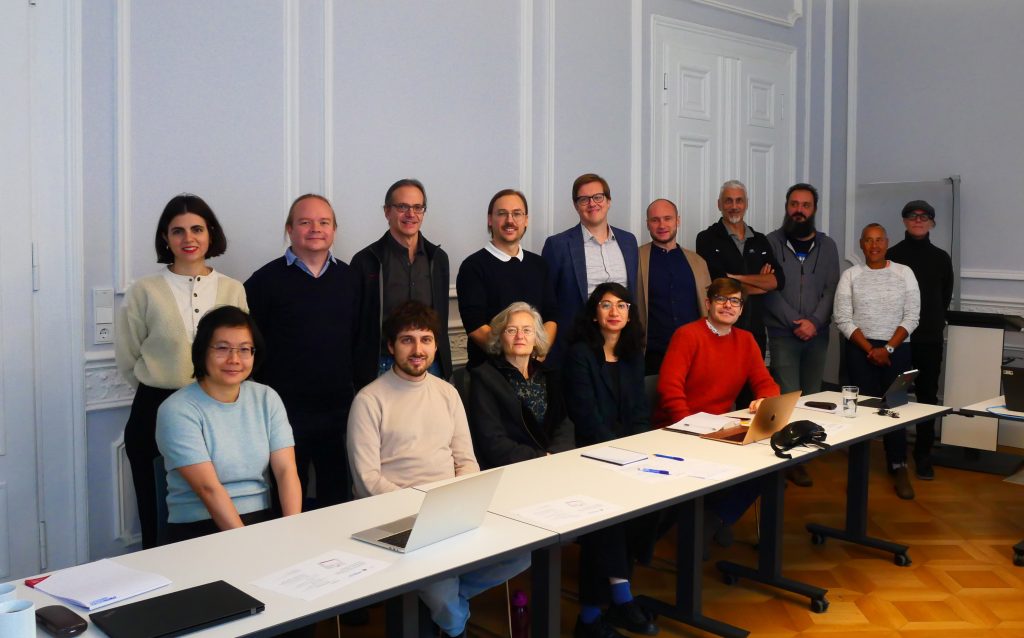
Cultures of research in dialogue
We would like to thank Wissenschaft im Dialogue for the inspiring Hackathon on science communication! We, the c:o/re team, learned a lot from the intense two-day dialogue we had on science, science communication, designing interactivity and many other related topics.
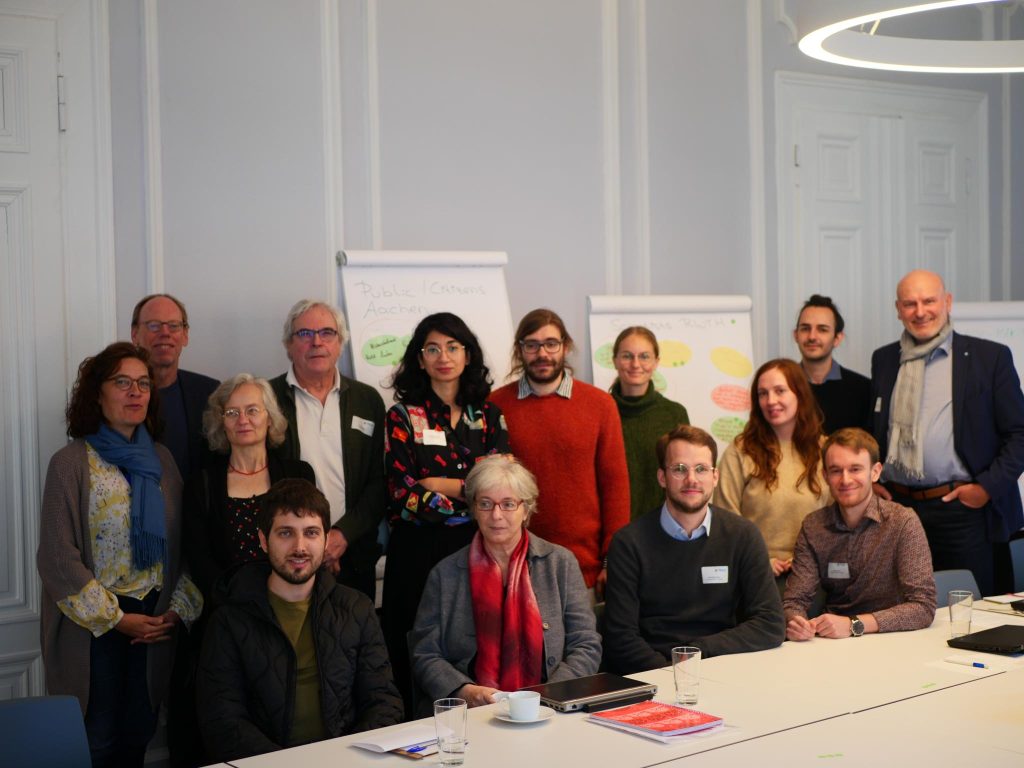
Introduction to the concepts of Open Science, Responsible Research and Innovation and Anticipatory Governance
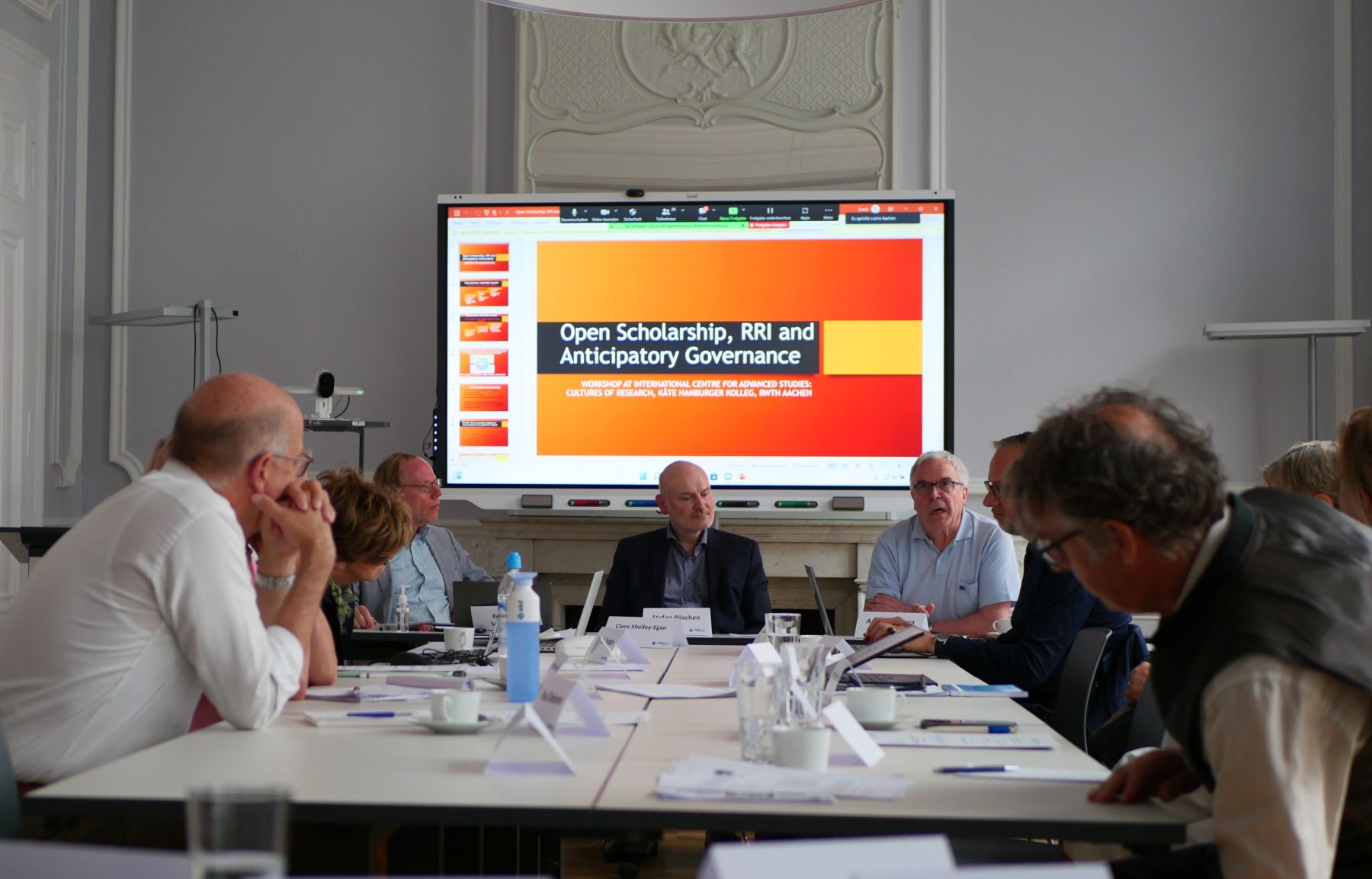
RENÉ VON SCHOMBERG AND ANDONI IBARRA
Responsible Research and lnnovation (RRI) has become increasingly important since it was introduced as a cross cutting issue under the European Union (EU) Framework Programme for Research and Innovation “Horizon Europe” (2014-2020). Subsequently, it became an operational objective of the strategic plan for “Horizon Europe (2021-2027)”, the new EU Framework Programme for Research and Innovation. ln EU member states, there are also various initiatives supporting RRI, notably under schemes of national research councils (the United Kingdom, Norway, and the Netherlands, among others). The concept also resonated outside the EU, notably in the United States, and in China it became part of the national five-year plan for Science, Technology and Innovation.
However, there are a variety of approaches as for how it should be implemented. Scholars provide a variety of perspectives and assessments of what RRI need to address. However, all scholars generally share the notion that RRI requires a form of governance that will direct or re-direct innovation towards socially desirable outcomes. This initial definition that Von Schomberg provided in 2011 captures the commonalities of the field:
Responsible Research and Innovation is a transparent, interactive process by which societal actors and innovators become mutually responsive to each other with a view to the (ethical) acceptability, sustainability and societal desirability of the innovation process and its marketable products (in order to allow a proper embedding of scientific and technological advances in our society).
This definition was not proposed as an end-result but as a starting point for an ever-growing field of research and innovation actions. The definition was put forward, first, to highlight that dominant public policies only negatively select science and technology-related options, notably by the management of their risks. According to the still dominant ideology, all innovation will contribute to common prosperity regardless of its nature. The notion of responsible research and innovation makes a radical break with such an ideology. Furthermore, this ideology tells us that innovations cannot be managed or be given a particular direction. Also on this front, the notion of responsible innovation breaks with this ideology and puts the power for a socially desirable change through innovations into the hands of stakeholders and engaged citizens. However, these stakeholders have to become, or be incentivized or even enforced to become, mutually responsive to each other in terms of social commitments to such change.
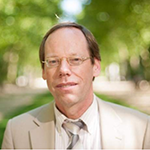
René von Schomberg
René is Guest Professor at the Technical University of Darmstadt, Germany. He was a European Union Fellow and Guest-Professor at George Mason University, USA, from 2007 to 2008 and has been with the European Commission from 1998 to January 2022. In his research project as a senior fellow at c:o/re, he focusses on the values of “openness” and “responsibility” in science policy.
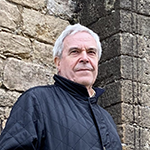
Andoni Ibarra
Andoni is Professor of Philosophy of Science at the University of the Basque Country (UPV/EHU). He is also the Principal Investigator of PRAXIS Research Group, the founder of the Miguel Sánchez-Mazas Chair. As a senior researcher at c:o/re, he is developing an anticipatory governance framework aimed at assessing and guiding the implementation of responsible anticipatory practices in research and innovation in the field of nanotechnologies.
Responsible Research and Innovation (RRI) imposes normative requirements on research and innovation processes resembling three successive steps of an incremental higher ambition with distinct features. The distinct features reflect the normative requirements of firstly, credible research (through among others ‘codes of conduct’ and standards for scientific integrity), secondly responsive research (by opening up science to societal demands), and finally responsible research (which includes the anticipation on socially desirable outcomes) for the research dimension. Equally distinct features reflect the requirements of credible innovation, responsive innovation, and responsible innovation (Von Schomberg, 2019).


For each of these steps, a framework for good practice is needed. The contributions to the workshop “Open Scholarship, Responsible Innovation and Anticipatory Governance” that took place on June 29-30, 2022, at the Käte Hamburger Kolleg: Cultures of Research, can be seen as attempts to contribute to these good practices for a single step or for multiple steps. First, the creation of knowledge in science underlies distinct universalizable codes for ‘good’ research conduct, enabling a global research practice that is virtually independent of cultural and national constraints. As the previous director of the US National Science Foundation Subra Suresh put it: ‘Good science anywhere is good for science everywhere’. The issue of ‘what is good science?’ can be seen as purely internal matter of the scientific community. Indeed, it has always been scholarly societies or academies of science who have tackled this issue of credible research, which arguably also constitutes the most basic requirement of RRI.
However, we should not forget these scholarly societies and other scientific institutions only engaged with the internal issue of good scientific conduct and scientific integrity because of external societal pressure and clear ethical challenges. That this is an issue which is far from settled.
Yet, Responsible Research and Innovation with within its dimension of ‘open scholarship’ has put additional pressure on revising or extending the normative requirements of this first step for RRI governance, namely credible research and thereby calling for revision of existing codes of conduct for good science particular with a view on achieving credible, reproduceable and re-usable data, all necessary to enhance science as such.
Open research and scholarship can be defined as ‘sharing knowledge and data as early as possible with all relevant knowledge actors‘ (Von Schomberg, 2019). Open research and scholarship (in the research policy-making context often simply referred to as ‘open science’) is operationalised by researchers who use, re-use and produce open research outputs such publications, software and data and who engage in open collaboration with other scientists, as well as seek, whenever appropriate for the subject matter of study, open collaboration with knowledge actors external to science such as industrial organisations, civil society organisations or public authorities.
During the Covid-19 pandemic, we have witnessed a change in the modus operandi of doing science as public authorities started to incentivize open science globally. This made it possible to deliver swiftly on vaccines. Without open science, the market introduction of these vaccines would have taken, under the usual circumstances of competitive and too closed forms of science, minimally a decade.
The research value ‘openness’ can be seen as a constitutional value for the scientific community as such. Open scientific discourse, the exchange of ideas and competing approaches is fundamental for the progress of modern science. ‘Openness’ is presupposed by the Mertonian norm ‘Communism’ (common ownership of scientific discoveries) and thus part of the ethos of science (Merton, 1942). However, the meaning of ‘openness’ is manifold and is dependent on the scientific discipline or the scientific mission in which it is embedded. With the emergence of Open Science, equally ethical issues concerning the limits to ‘openness’ in particular contexts become evident, such as the employment of sensitive data in security or biomedical fields.
Open research and scholarship manifest itself notably in the case of interdisciplinary scientific cooperation with a view on developing a socially desirable output as the case of Covid-19 demonstrated. Open research and scholarship have been incentivized with a view of making science more efficient (better sharing of resources), more reliable (better verification of research data) and making it more productive with a view on a socially desirable output (in this case a vaccine). Research virtues or norms have been phrased historically as a subset of general human virtues. From the Mertonian CUDOS norms (Merton,1942) to the codified principles of research integrity incorporated in the All European Academies’ European Code of Conduct for Research Integrity, norms or principles have been described as a fundament of a ‘good’ research practice. The ‘responsibility’ of the scientific community is then often described as an overarching duty to promote, manage, and monitor a research culture that is based on the scientific integrity of its members (ALLEA, 2017). Furthermore, research integrity does include a particular form of responsibility, namely the accountability for the whole internal process of science from idea to publication. The ‘implementation’ of scientific integrity is managed by self-regulation of the scientific community.
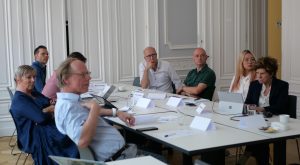
Traditionally the scientific community has stopped short of taking any form of responsibility for consequences and side-consequences of the societal use of scientific insights and technologies and its unpredictable societal impacts. The responsibility for those consequences has been ‘allocated’ to the political system. This division of responsibilities has become subject of intense debate, virtually since the whole period after Word War II. Intense debate on the risks of emerging technologies have led to the adoption of national laws and European directives on the risks, the quality and efficacy of products arising from the use of new technologies. Western societies have gained the capacity to indirectly govern emerging technologies, notably through its risk management and to outlaw specific undesirable outcomes, such as cloning human beings. Our institutions have thus governance structures in place to manage the risks of technologies such as nuclear technology, genetic or nanoengineering. However, we do not have established capacities to anticipate or direct science and innovation towards socially desirable outcomes such as vaccines or outcomes that underpin or make the transition towards sustainability possible. Responsible Research and Innovation (RRI) has emerged as response to this deficit in the governance of science and technology. RRI requires a form of governance that will either direct science towards socially desirable outcomes or manage innovation processes in such a way that those socially desirable outcomes are more likely to emerge (Von Schomberg 2019).
It is therefore desirable to develop further a governance framework which institutionalizes the organization of co-responsibility across the spheres of science, policy and society on a subject matter which require open science missions such as Covid-19. The institutionalization of co-responsibility requires a governance which goes beyond self-regulating mechanisms within science itself. There is a ‘responsibility’ for ‘organizing co-responsibility,’ shared by scientific, policy and societal actors. The institutionalization of this responsibility will have consequences for the way science is funded and organized, for example through policy and financial incentives to embark on socially relevant open research missions. For example, by means of co-creation and co-design of research agendas with scientific, policy and societal actors which are currently foreseen in the “Horizon Europe (2021-2027)” program. An important aspect is the governance of the research missions themselves. When open research missions are conducted to achieve a socially desirable objective, its governance and organization will significantly have to differ from research missions with a primary technological objective (for example: ‘putting a man on the moon’). In fact, the ultimate step to complete RRI with anticipatory governance is inherent for this type of mission-oriented research.
The governance of research of innovation based on a Framework of RRI thus requires credible research, open and responsive research and responsible research that anticipates socially desirable outcomes. This anticipation also presupposes that such research and innovation is inevitably value-driven as those values mark the desirability or undesirability of research and innovation outcomes.
The desirability of open scholarship is often motivated by the wish to achieve better scientific practices. However, RRI is more ambitious and represents an effort to drive research and innovation towards socially desirable outcomes. We, therefore, must address the question how we can define these outcomes, for example by the way we anticipate them. The employment of foresight is one of the few tools we have at our disposal, and possibly the most robust one. Broadly speaking, anticipation can be defined as an activity characterized by the use of the future (or futures) to guide and orient decision making in the present. Anticipation must therefore be distinguished from forecasting.
The question of socio-technical futures is critical in this context because the ways in which scientific and technological practices are articulated derive from the anticipatory capacity, that is to say, from the capacity to promote certain research and innovation trajectories in the present on the basis of visions and expectations regarding future promises. Therefore, anticipatory responsibility goes beyond the traditional tendency to approach responsibility as a mere regulatory exercise; an exercise in which the socio-economic justification of scientific or technological innovations is not problematized, on the basis of future promises linked to them. This activity of futures building opens the door to publics. Anticipatory governance is an instrument for the engagement of publics in the exercise of opening science and innovation that should contribute to a more robust articulation of the relations between societal actors.
Anticipatory innovation processes are understood as open and deliberative processes, in which the values, motivations and expected benefits of innovations appear to be subject to public scrutiny. As such, the understanding of those anticipatory innovation processes emphasizes the need to critically and openly analyze the ways in which socio-economic and environmental challenges and their potential solutions are established. This implies recognizing anticipation as a fundamental component of responsible governance; a component that enables the construction of “socio-technical futures” as a guide for decision-making in the present. It is fundamental because anticipation becomes the component that modulates the degree of responsibility of responsible open scientific-technological practices. However, despite its central relevance, the meanings of anticipation and anticipatory governance are divers, often disparate, if not contradictory, as Mario Pansera showed in his presentation.
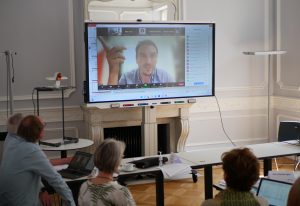
In this context of plurality of meanings, the risks of the very concept of anticipatory governance for the achievement of more responsible science and innovation should not be forgotten, as Alfred Nordman and others have shown. Not only because some anticipatory governance understandings close down the field of possible alternatives and courses of action. (We can call them closed anticipatory governance patterns.) The risks arise above all, however, because anticipatory governance is permanently connected to the risk of instrumentalisation by an innovation system highly committed to techno-industrial developmentalism and economic competitiveness. Therefore, its contribution to responsible science and innovation and its transformative potential should not be taken for granted. Attention needs to be paid to the way in which power relations and instrumentalisation dynamics characteristic of innovation systems tend to exclude, or to close down, the emergence of alternative ways of approaching scientific-technical co-creation. That’s why, among other things, the transformative potential of anticipation towards more responsible forms of scientific practice has to remain analyzed and explored.
Reference
All European Academies (2017), The European Code of Conduct for Research Integrity: https://allea.org/code-of-conduct/
Burgelman J-C, Pascu C, Szkuta K, Von Schomberg R, Karalopoulos A, Repanas K and Schouppe M (2019), Open Science, Open Data, and Open Scholarship: European Policies to Make Science Fit for the Twenty-First Century. Front. Big Data 2:43.
Merton, Robert K. 1979 [1942]. “The Normative Structure of Science.” In The Sociology of Science: Theoretical and Empirical Investigations. Chicago: University of Chicago Press.
Von Schomberg, R (2019), Why responsible innovation in: R. Von Schomberg and J. Hankins (eds) International Handbook on Responsible Innovation: A Global Resource. Cheltenham: Edward Elgar, pp. 12–32.
Rene runs a blog with free downloadable resources on RRI: https://Renevonschomberg.wordpress.com
proposed citation: René von Schomberg and Andoni Ibarra (2022). Introduction to the concepts of Open Science, Responsible Research and Innovation and Anticipatory Governance. https://khk.rwth-aachen.de/2022/07/25/3892/3892/
Roundtable on Open Scholarship Responsible Innovation and Anticipatory Governance
Can open scholarship make science more reliable, responsive, credible and inclusive? What is the significance of anticipatory governance for open science and responsible research and innovation? Discuss these and other questions at a roundtable together with our fellows René von Schomberg and Andoni Ibarra. They have invited experts such as Clare Shelley Egan (Technical University of Denmark), Douglas Robinson (Université Gustave Eiffel), Mario Blok (Wageningen University), Frank Miedema (Utrecht University), Roberto Poli (University of Trento), Paola Zaratin (Italien MS Society), and Marianne Hoerlesberger (Austrian Institute of Technology). Klick here to learn more about the program and to join the discussions, please register with events[at]khk.rwth-aachen.de.
Art’s Realism in the Post-Truth Era
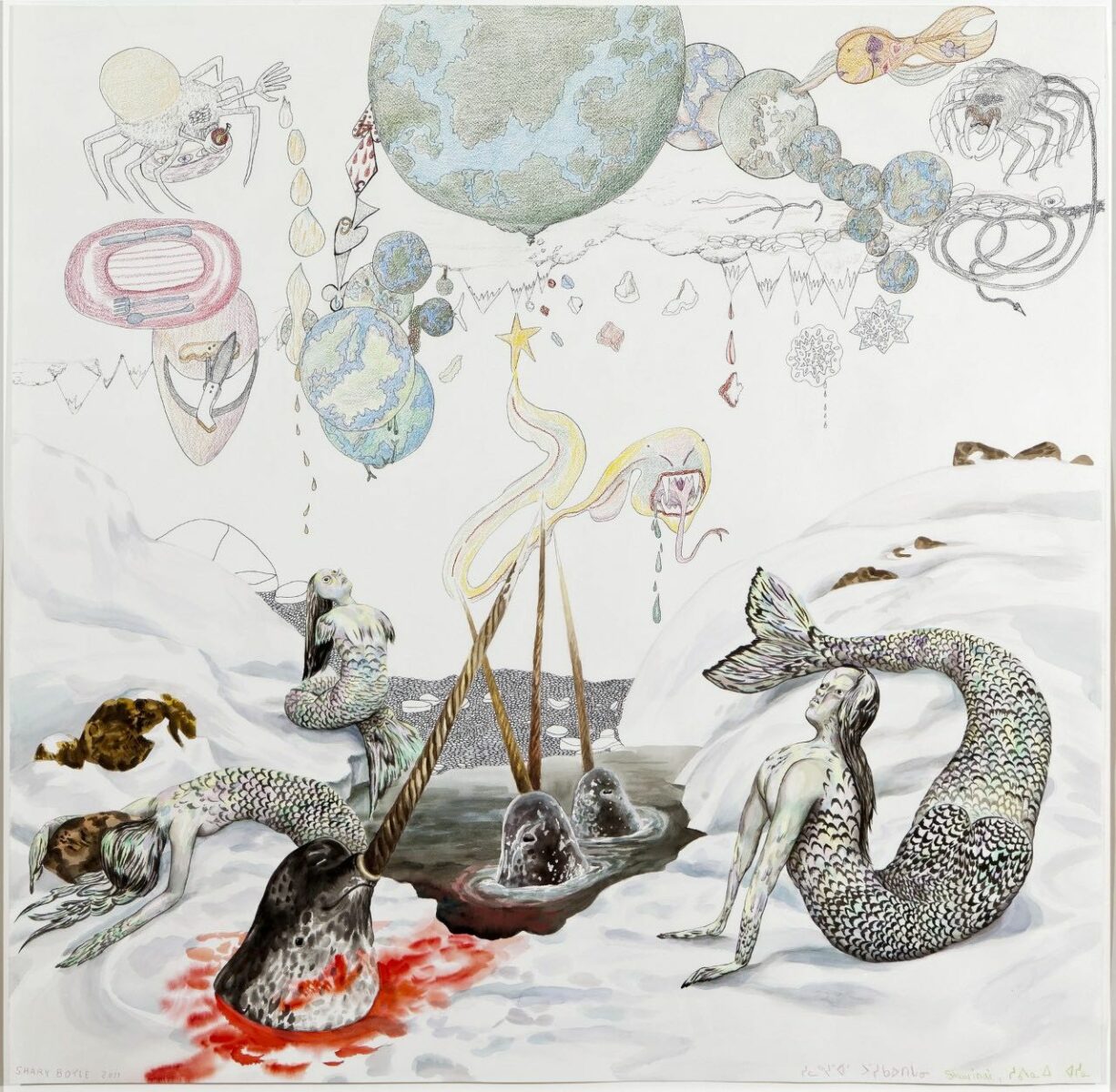
Amanda Boetzkes and Käte Hamburger Kolleg Aachen: Cultures of Research (c:o/re) are hosting this three days Workshop on 21 – 23 June 2022
The last decade has seen a growing preoccupation with philosophies of realism from artists, curators, and theorists. But while the art world benefits from this domain of philosophical inquiry, the reverse is also true: the significance of realism in an era characterized by fake news, post-critical theory, mass extinctions, climate change, and the precarity of existence due to war and other forms of displacement, can only be fully appreciated by attending to the ways that art captures, mediates, and even shapes our understanding of reality. Taking art’s constitutive relationship to realism seriously, this workshop intervenes on contemporary debates about realism after truth by demonstrating that art does not simply illustrate philosophical theories, it requires their redefinition. The contributors will situate realism in relation to the aesthetic dimensions of media imaging, scientific visualization, bodily expression and perceptual enhancement. Bringing together advanced scholars from art history, media studies, philosophy, literature and social theory, the workshop foregrounds the importance of art’s realism in a global ecology.
c:o/re Workshop
Organized by Amanda Boetzkes
Respondents
Raphaelle Occhietti (University of Guelph)
Kyveli Mavrokordopoulou (École des Hautes Études et Sciences Sociales)
Coordination of event
Ana María Guzmán Olmos (c:o/re Aachen, University of Bonn)
Location
Haus Matthéy, Theaterstraße 67, 52062 Aachen
We have a restricted number of seats to attend in person. After we have reached the amount of available seats in person, we invite you to join us online.
Please register with: events@khk.rwth-aachen.de
Join online with this link:
https://rwth.zoom.us/j/95596822592?pwd=OWpUL1V6eUkzTW1JMFRKZHdaQTdidz09
Program:
Tuesday, June 21, Haus Matthéy
10:00-10:30
Introduction: Eight Theatrical Rotations Around Art’s Realism
Amanda Boetzkes (c:o/re Aachen, University of Guelph)
10:30-12:00
In the Thickness of Reality: An Aesthetic of Indifference and Concealment in Eva and Franco Mattes’ The Bots
Maryse Ouellet (University of Bonn)
Abstract
In 2017, film scholar Erika Balsom wrote a plea for a realist approach in film, namely the observational mode. Her essay argued that the task of vanguard documentary in the posttruth era was to “problematize access to phenomenal reality.” The notion of “access,” however, must be questioned, since it presupposes our separation from reality (Benoist, 2011). In a time when the fabric of reality is stripped from moral standards and lies are allowed to circulate more or less uncensored on social media, the challenge facing art’s realism today is perhaps less a matter of problematizing access to reality than problematizing reality itself, that is to say, to probe the chasm between reality and truth.
In their recent video series, The Bots (2020), artists Eva and Franco Mattes’ have taken on this task, by tracking down former Facebook content moderators who disclosed the psychologically damaging work they used to perform, skimming the illicit and the obscene “digital waste” (Roberts, 2016) like janitors in the shadows of social media. The videos, however, do more than giving access to a hidden dimension of reality: they also merge heterogeneous layers of reality, thereby situating the testimonies in an economy of the visible governed by “radical indifference” (Zuboff, 2019). The testimonies are indeed rendered on screen by six actors who lend their bodies and voices to the anonymized workers, while pretending to deliver makeup tutorials, speaking to their cellphones from their apartment. The disconcerting and humorous channeling of unknown individual predicaments through the widely disseminated and standardized tutorial format takes inspiration from an activist practice ironically consisting in circumventing moderation by sneaking political content into apparently innocent beauty videos or reels (Kuo, 2019). In this workshop, I want to examine The Bots’ aesthetic of equivalence and concealment to reflect on the implications of art’s realism in the post-truth era. How can aesthetic convey the thickness of reality on social media? How to be realist, when reality is deceptive? These are some of the questions I would like to offer for consideration.
12:00-13:30
Lunch
13:30-15:00
Homeless realism (post-metaphysics, post-truth and posterity)
Hilan Bensusan (University of Brasilia)
Abstract
The realist stance is a combination of two gestures: one that affirms the independence of things from us and another that asserts their permanence, stability and full presence. Both gestures were combined in Plato – and tied together by Aristotle’s reading of Plato’s positions – into what became metaphysics. Around this endeavor, the first gesture – that of independence – was sometimes questioned and abandoned. The second one, nevertheless, proved to be more persistent. Speculative realism, intending to revive the issues around realism, often elaborates new strategies to argue for a package involving the two gestures. The spectral realism gambit, arguably a post-metaphysical one, is to dismiss permanence while keeping independence. In that sense, it discards ousiai as the ultimate commitment somehow required by any form of realism. The rejection of ousiai – substances, presences, homes or perhaps archives that keep something in its proper kernel no matter the concealment happening in what appears – makes room for a realism where what is real is intermittent like what depends on the retrieval from an archive.
Post-metaphysics is contemporary of post-truth. There is a sense in which post-truth is a consequence of the original metaphysical efforts to be able to extract the intelligibility of truth and be able to mimick it by artificially producing its effects. One of the effects of truth is that it generates a network of reliability. Reliability itself has connections with permanence stability and substance. Interestingly, post-truth also reveals the limitations of asserting the full presence of things. Two kinds of responses are then possible: to recoil to a defense of a metaphysical realism or to move somehow forward and explore the impermanence of what is archived – and the ireducible indexical character of whatever is in the past (and can only come back to the fore if rememorated now).
Wednesday, June 22, Haus Matthéy
10:30am- 12:00
The Theatre of Operations
Oxana Timofeeva (European University St. Petersburg)
Abstract
The talk will conceptualize the idea of the theatre of war operations. The theatricality of war, read literally, will be addressed in its specific temporality of repetition, as well as in its spatial characteristics, its architectures and geo-logics – the scene, the battle ground, and the undergrounds of war, from bomb shelters and trenches to mass graves. I will also focus on the unconscious scenarios in the theatre of war, discuss the structure of desire and the scenes of its phantasmatic realization.
12:00-13:30
Lunch
13:30-15:00
Can Waves Write Poems? Immanent Purposiveness and the Matter of Meaning
Jeff Diamanti (University of Amsterdam)
Abstract
Can matter story itself, and (if so) is its story coherent? It would appear so given the citational record mounting in various branches of environmental and post-humanities. Yet the largely unresolved polemic of the infamous “Against Theory” by Walter Benn Michaels and Stephan Knapp resolves precisely on this question posed from the standpoint of meaning’s hermeneutic envelope. Returning to the formative distinction between form and matter at the heart of Hegel’s philosophy—and more specifically two recent resuscitations of Formtätigkeit (form activity) in the philosophy of Karen Ng and Michael Marder—I attempt to ask and then answer if indeed the nominalization of “storied matter” underwriting much ecocritical theory is an analytic contradiction in terms (and hazard two arguments about what that contradiction might inflect elsewhere in the constellation of materialist criticism).
Thursday, June 23, Haus Matthéy
10:30-12:00
Art Between Realism and Warnings (via zoom)
Santiago Zabala (ICREA/Pompeu Fabra University)
Abstract
The ongoing return to realism and order in art, politics, and culture and the increasingly narrow focus of experts have prevented us from taking warnings seriously. Too often these are discarded as useless or insignificant—much like environmentalists, artists, and philosophers—when in fact they are vital to understanding our spiritual predicament. Though philosophers can’t solve the ongoing emergencies—philosophy was never meant to solve anything—we can interpret their signs. Warnings—not to be confused with predictions—are not meant to convince anyone but invite us to reevaluate our priorities for the future. Unlike recent philosophies of animals, plants, or insects, my philosophy of warnings is more than a philosophical elucidation of a global environmental emergency. It is the ontology within which these issues exist. Phenomenologically we could say that these reacting philosophies are regional ontologies whereas ours is the fundamental one that encompasses all of them. Warnings allow us to think transcendentally without losing sight of actual political, social, and technological urgent matters.
“This word Being,” as Martin Heidegger once said, “serves as a warning to us,” a warning that reality is not made merely of beings and that its truth is not exclusively what can be measured or verified. The central argument in favor of a philosophy of warnings is not that what it warns of comes to pass but rather the pressure it exercises against those emergencies hidden and subsumed under the global call to order. This pressure demands that our environmental, political, and technological priorities be reconsidered, revealing the alarming signs of climate crisis, democratic backsliding, and the commodification of our lives by surveillance capitalism. These warnings are also why we should oppose any demand to “return to normalcy” after an emergency, which signals primarily a desire to ignore what caused the emergency in the first place. A philosophy of warnings seeks to alter and interrupt the reality we’ve become accustomed to through stances that are engaged, interested, and respondent to warnings.
12:00-13:30
Lunch
13:30-15:00
Parallel Perspective: A Forgotten Realism
Jens Schröter (University of Bonn)
Abstract
One of the classical ingredients of the difficult notion of realism, at least in the history of painting, is central perspective. Central perspective (ideally) follows the rules of the propagation of light (at least as seen from the standpoint of geometrical optics) and thereforen mimics the appearance of the real world. It produces thereby (ideally) a coherence of the depicted space and a potential continuity to the space of the beholder. By relating the representation to the viewpoint of an observer (at least in one point-perspective) it moreover
seems to duplicate our experience of watching the real world. But this subjective aspect of perspective also potentially disturbs the alleged realism, since it shows an object or scene from one, contingent standpoint. This leads, on the one hand, to the complicated problems of perspectivalism and the questions of the situatedness of knowledge.
There are a lot of discussions on that (see e.g. Alloa: Partages de la Perspective). On the other hand, there is a much deeper problem for ‘realism’ caused by central perspective: Central perspective distorts the represented scene, relative lengths, angles etc. change. It is for example difficult to reconstruct a machine or a building from a centralperspectival representation – for images that do realistically pre-present structures like machine or buildings forms of parallel perspective are routinely used. These are much more important as a medial infrastructure for modern technical culture as is central perspective. Moreover, digital image generation can use routinely parallel perspective – as different from the optical media like photography. With digital imaging an important representational tradition from drawing and painting is revived (e.g. in Computer Aided Design).
Given this extreme importance it is strange, why parallel perspective does not play a for more central role in discussions of realism. Parallel Perspective is used for a realism of the objects instead of the subject, so to speak. That should also make Parallel Perspective an interesting topic of study for theoretical positions that discuss the properties of the ‘object’ as such. Several aspects of these complicated problems in and around parallel perspective are discussed in my presentation.
15:00-15:30pm
Break
Thursday, June 23, c:o/re, Theaterstr. 75 (Statdpalais), lecture hall
15:30-17:00
Steve Fuller (c:o/re Aachen, University of Warwick)
Closing Remarks and Discussion
An-Archaeology and Spectral Realism with Hilan Bensusan at c:o/re (June 14)
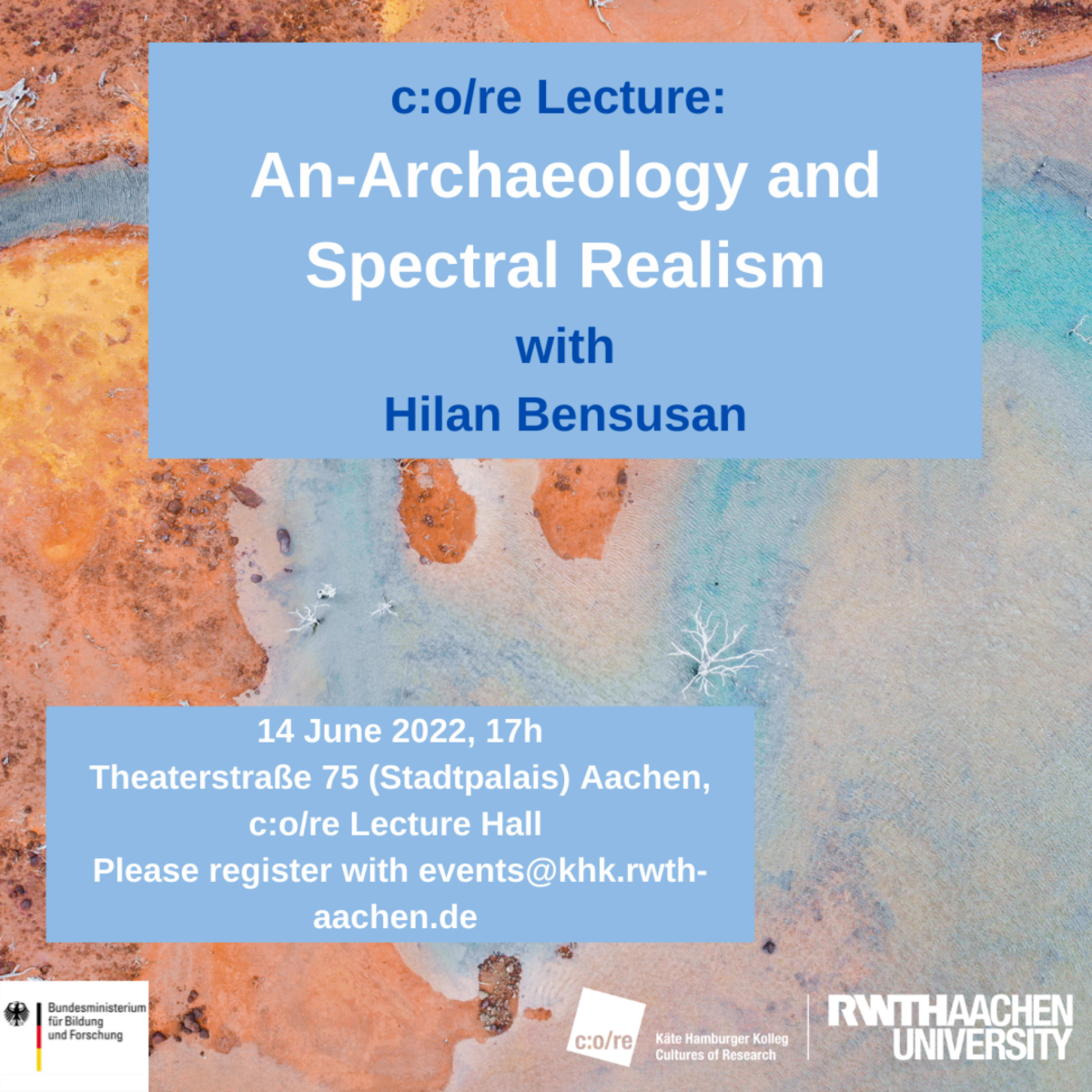
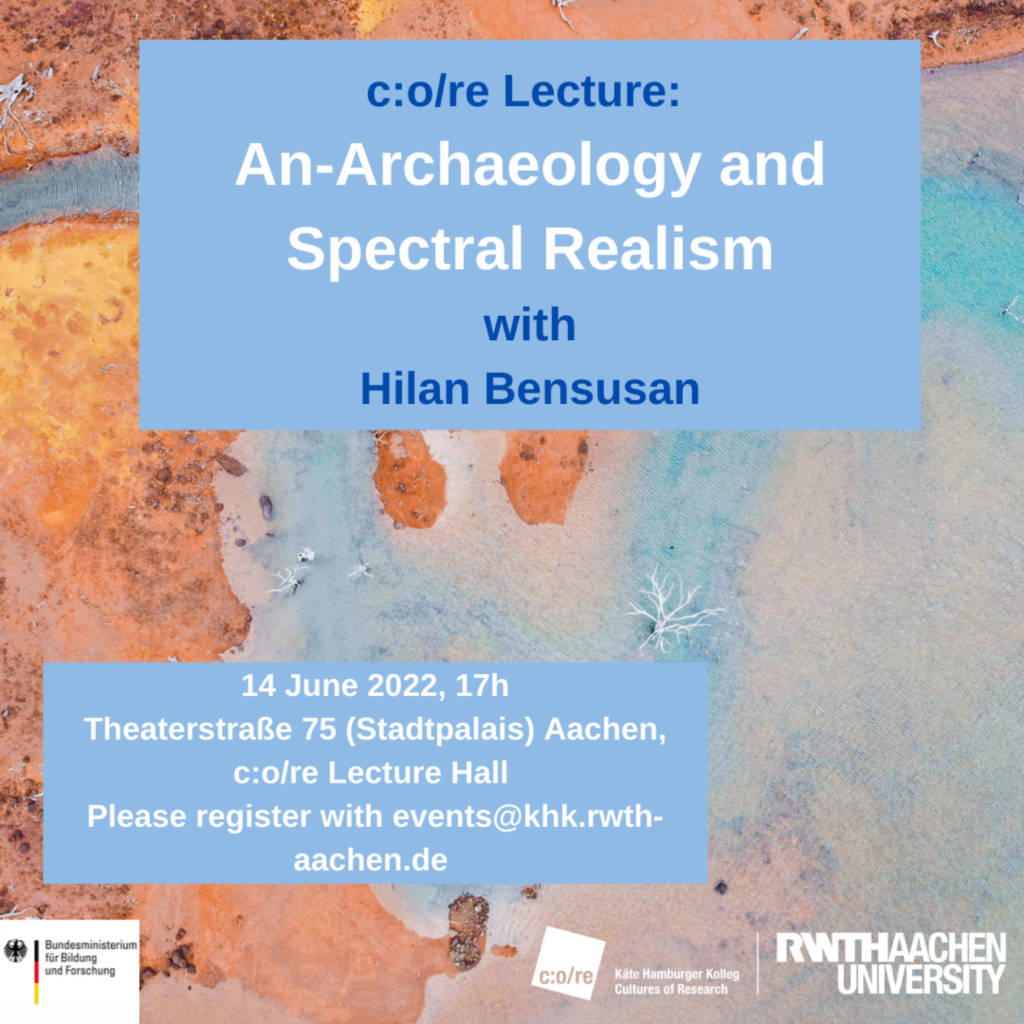
As an introduction to this week’s workshop on Art’s Realism, organized by Amanda Boetzkes at c:o/re, on June 14th at 17:00 Professor Hilan Bensusan gave a lecture on An-archaeology and spectral realism. The manuscript of the talk can be found here.
Hilan Bensusan is Professor of Contemporary Philosophy at the University of Brasilia. He is the author of Indexicalism: Realism and the Metaphysics of Paradox (Edinburgh University Press, 2021) and Being Up for Grabs: On Speculative Anarcheology (Open Humanities Press, 2016). He also published Portuguese: A diáspora da agência – Ensaio sobre o horizonte das monadologias (The diaspora of agency – Essay on the horizon of monadologies) (EdUFBA, 2018), Linhas de animismo futuro (Lines of future animism) (Mil Saberes, 2017), Heráclito – Exercícios de Anarqueologia (Heraclitus – Exercises in anarcheology) (Ideias e Letras, 2012) and Excessos e Exceções (Excesses and exceptions) (Ideias e Letras, 2008).
Engineering Practices Workshop: The Use of Networks in the Humanities and Social Sciences
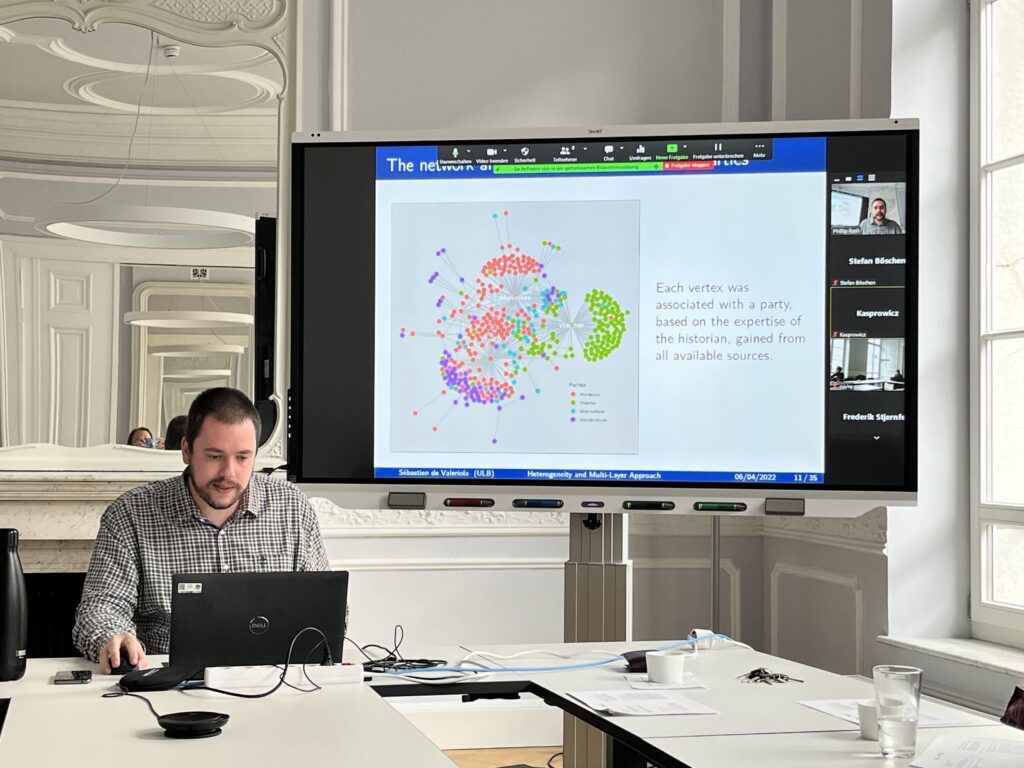
Middle Ages: A Multi-Layer Network Approach”
On May 30th – June 1st, c:o/re hosted the workshop The Use of Networks in the Humanities and Social Sciences, part of the Engineering Practices series and organized by Professor Ana Bazzan together with Phillip H. Roth and Alin Olteanu.
The aim of the workshop was to chart the use of networks in the humanities and social sciences and the consequences of the use of such epistemic tools for the way we understand science, society and the world. As such, the event gathered a variety of perspectives on networks and applications of network analysis, from the mathematics of networks to media analysis, historical research and to tackling questions on technology.
A point of convergence among these varied approaches is that, as models, networks have become a central epistemological tool in many sciences as well as vernacularly, not least because of the mainstreaming of social media and their role in networking communities and academic disciplines across previously established boundaries. A particularly interesting takeaway point of this workshop is that, as models and as representations, networks have become a common analytical tool in many fields of research, thus allowing for multi-perspective discussions on methodology.
